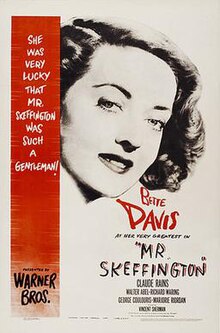Mr. Skeffington
| Mr. Skeffington | |
|---|---|

Original poster
|
|
| Directed by | Vincent Sherman |
| Produced by |
Julius J. Epstein Philip G. Epstein Jack L. Warner |
| Written by |
Elizabeth von Arnim Julius J. Epstein Philip G. Epstein |
| Starring |
Bette Davis Claude Rains |
| Music by |
Franz Waxman Paul Dessau |
| Cinematography | Ernest Haller |
| Edited by | Ralph Dawson |
| Distributed by | Warner Brothers |
|
Release date
|
|
|
Running time
|
145 min. |
| Country | United States |
| Language | English |
Mr. Skeffington is a 1944 American drama film directed by Vincent Sherman, based on the novel of the same name by Elizabeth von Arnim.
The film stars Bette Davis as a beautiful woman whose many suitors, and self-love, distract her from returning the affections of her husband, Job Skeffington. It also makes a point about Skeffington's status as a Jew in 1914 high society and, later, in relation to Nazi Germany.
It stars Claude Rains as Skeffington, along with Walter Abel, George Coulouris and Richard Waring.
In 1914, spoiled Fanny Trellis (Bette Davis) is a renowned beauty, with many suitors. She loves her brother Trippy (Richard Waring) and would do anything to help him. Fanny learns that Trippy has embezzled money from his employer Job Skeffington (Claude Rains). To save her brother from prosecution, Fanny pursues and marries the lovestruck Skeffington. Disgusted by the arrangement, in part because of his prejudice against Skeffington being Jewish, Trippy leaves home to fight in the Lafayette Escadrille in World War I.
Job loves Fanny, but she is merely fond of him and largely ignores him. She becomes pregnant with his child, but, when Trippy dies in France, she states she is "stuck" with Job, and the marriage then becomes wholly loveless, continuing only for the child's sake. Job and George Trellis, Fanny's cousin, also enlist, but are stationed near home.
Fanny enjoys playing the wealthy socialite, stringing along a persistent quartet of suitors who are unfazed by her marriage, as well as much younger lovers. Lonely, Job finds solace with his secretaries. When Fanny finds out, she divorces him, conveniently ignoring her own behavior.
Fanny neglects her young daughter (also called Fanny), who understandably prefers her loving father and begs him to take her with him to Europe. Although Job fears for his child and tries unsuccessfully to explain to her the nature of prejudice she will encounter as a Jew abroad, he finally, tearfully and joyfully, says yes. Fanny is relieved to be free of the encumbrance of a child. Fanny has a series of affairs, living well on the extremely generous settlement Job has left her - half his fortune - and hardly giving a thought to her daughter, whom she does not see for many years.
...
Wikipedia
